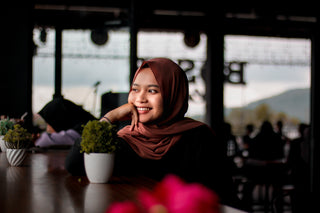Muslim holidays are days of significance that are observed and/or celebrated by followers of Islam worldwide. All the important days in Islam have plenty of historical and cultural significance behind them. While some days are common to all Muslims, others are specific to the different sects and communities in the Muslim world. These holidays are observed according to the lunar-based calendar in Islam.
In this article, we listed down the 10 biggest Muslim holidays you should know about:

#1. Ramadan
The ninth month of the Islamic calendar is called Ramadan. It is a time of fasting, additional worship, and abstinence for Muslims around the globe. It is the most well-known Islamic holiday. Fasting during the day of Ramadan is one of the most important aspects of Islam since it's also one of the Five Pillars of Islam.
Muslims go to mosques more often to pray and ask for forgiveness during this month. There are additional prayers that are held at night after the regular prayers known as "Taraweeh." Muslims also give more to charities during this month so that the less-privileged may celebrate the month more comfortably.
The purpose of this month is for Muslims to improve their lives in religious and personal ways.
#2. Laylat al-Qadr
Laylat al-Qadr, when translated from Arabic, means "The Night of Power." It is the night when the first verses of the Quran were believed to be revealed to Prophet Muhammad (PBUH).
The night is believed to have been one of the 10 final nights of Ramadan when the Quran was bestowed to Prophet Muhammad; however, the exact date of the night is unknown. Being the holiest and most important night of the year for Muslims, it is spent reciting the Quran, praying to Allah (SWT), and asking for His forgiveness. Many also give to charity to commemorate the night.

#3. Eid Al-Fitr
This is a festival of celebration and feasting. It commemorates the end of the Ramadan month. Translated it means "the Festival of Breaking Fast" and is one of the two official holidays of Islam. The festival spans three days, but the primary celebrations are done on the first day.
It starts with a communal prayer right after daybreak. On this day, people visit their friends and families to greet them while kids are given "eidi" (which means gift) by their elders. This Muslim holiday is also marked by big feasts where everyone comes together to celebrate. The day is a time for thanking Allah (SWT) for the His blessings.

#4. Hajj
Hajj is the pilgrimage that millions of Muslims around the globe make to the holy city of Mecca in Saudi Arabia. The event known as Dhul Hijjah takes place on the 12th and final month in the Islamic calendar. This pilgrimage is known as Hajj and lasts between 5 to 6 days.
Hajj is also one of the Pillars of Islam, and Muslims who have the means and resources are encouraged to make it at least once in their lifetime.
#5. Day of Arafah
This Islamic holiday falls on the 9th day of Dhul Hijjah and is considered the holiest day in the Islamic calendar. It is the second day of Hajj, and it precedes the major Muslim holiday of Eid al-Adha. Pilgrims gather at Mount Arafah on this day to commemorate the site where Prophet Muhammad (PBUH) gave one of his last sermons. Muslims elsewhere around the world celebrate the occasion by fasting during this day.
#6. Eid al-Adha
Eid al-Adha pays tribute to the trial of Prophet Ibrahim (or AS) when he made the ultimate sacrifice for Allah (SWT). This Muslim holiday falls on the 10th day of Dhul Hijjah, the final month of the Islamic year. The festival is celebrated with a ritual of sacrifice. Muslims sacrifice an animal like sheep, goats, or camels.
The meat obtained from this ritual is split into three parts — one part is donated to the poor and the needy, the second part is shared with relatives and friends, and the last part is kept for the family. The name thus aptly translates to "the Feast of Sacrifice."
#7. Ashura
The day of Ashura is observed differently by the Sunni and Shia sects of Islam. Ashura occurs on the 10th day of the first Islamic month, Muharram. Shias observe this day as a period of mourning as it was on this day when Prophet Muhammad's (PBUH) grandson Husayn Ibn Ali was martyred.
Sunnis observe this day as the day when Prophet Moses (PBUH) and his followers were saved from the oppression of the Pharoah, and a lot of Muslims commemorate the occasion by fasting.
#8. Arba'een
Arba'een is a commemoration that is specific to the Shia Muslim community. It occurs on the 40th day after Ashura. It is observed as a night of remembrance and grieving for Prophet Muhammad's (PBUH) grandson, Husayn Ibn Ali who was martyred on the 10th day of Muharram in the Battle of Karbala.
In Muslim tradition, forty days is the usual length of mourning after the death of a loved one which is why this day is commemorated by Shias globally.

#9. Mawlid (Eid-e-Milad un-Nabi)
This Muslim holiday is a celebration of the birthday of Prophet Muhammad (PBUH). It falls on the 12th Rabi' al-Awwal, the third month in the Islamic calendar. The celebration of this festival takes many different forms and entails rituals across the different schools of thought in the Muslim world. In most places, charity and food are distributed among the poor and people narrate stories and poetry about the life of Prophet Muhammad (PBUH).
#10. Eid al-Ghadir
Eid al-Ghadir is a significant Islamic holiday that is commemorated by the Shia and Bektashi Muslim sects. It is the anniversary of the day that Prophet Muhammad (PBUH) announced Ali ibn Abu Talib as his successor.
This festival is celebrated on the 18th day of the Islamic month of Dhul Hijjah. It is marked by reciting and reading about the history and teachings of the Prophet as well as Ali Ibn Abu Talib.
That concludes our list of the 10 biggest Muslim holidays. Whether you're looking to grow your faith or just familiarize yourself with them, knowing about them can help you observe important dates in the Islamic faith.
786 Cosmetics introduces breathable nail polishes that are tailored for the Muslim community. Our products are formulated to fit Islamic requirements without compromising on good quality. From premium Halal nail polishes to nail care products, you can wear them while still practicing your beliefs and traditions. Follow 786 Cosmetics on Instagram for updates.
Author: Keren Dinkin



online Quran classes UK
amazing way of explaining Muslims festival , loved your article